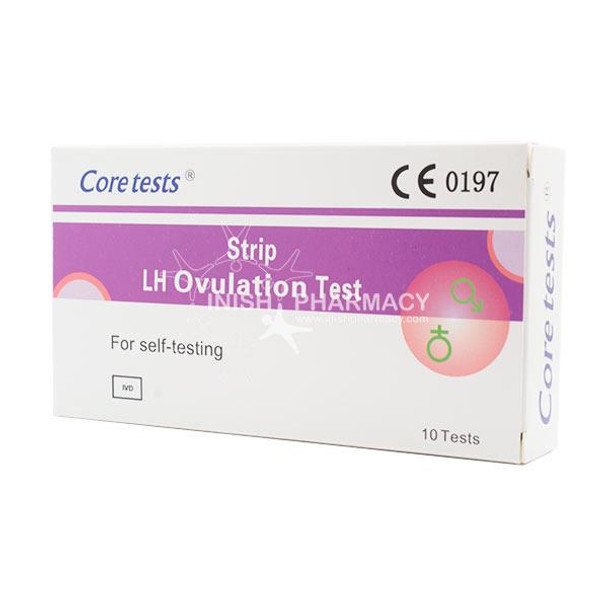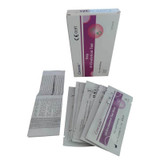The Core Test Ovulation Test strip is most economical way to test for ovulation. The test strip will detect your LH (Luteinizing Hormone) Surge which is when you are most fertile. It is as accurate as chemist brands but we bring it to you at a fraction of the cost suitable for couples who will be testing a lot. The test works by simply dipping it in to urine and one of two results will appear: one line indicates you are not ovulating, while two lines means you are ovulating and is it’s a good time to have intercourse and enhance the possibilities of conceiving.
Key Features:
- The most economical way to test for ovulation.
- As accurate as chemist brands, at a fraction of the cost.
- Easy to use.
- Increased chance of contraception when used.
How to Use:
- The test strip and urine have to be at room temperature for testing
- Remove the test strip from the sealed pouch
- Immerse the strip into urine with the arrow pointing towards the urine
- Take the strip out after three seconds and lay the strip flat on a clean, dry, non-absorbent surface
- Important: do not allow the urine level to exceed the Max line, otherwise the test will not perform correctly
- Read results in five minutes. Do not read results after five minutes.
*Do NOT use First Morning Urine as LH is synthesised in your body early in the morning. It will not show up in your urine until later in the day.
LH Surge (Positive)
If two colour bands are visible and the test band is equal to or darker than the control band, one will probably ovulate in the next 24-48 hours. If trying to get pregnant the best time to have intercourse is after 24 hours but before 48 hours.
No LH Surge (Negative)
Only one colour appears on the control region, or the test band appears but is lighter than the than the control band. This means there is no LH Surge.
Invalid
No visible band at all, or there is a visible band only in the test region and not in the control region. Repeat with new test kit. If test still fails, please contact medical test centre.
Relevant Blogs:
Read: How do I know when I'm Ovulating?
Related Products:
- The Early Pregnancy Tests can detect pregnancy in the early stages accurately and for a fraction of the cost of other tests. These are ideal for couples who will be using many tests and don’t want to spend too much money on them.
- Using Preseed - Sperm Friendly Lubricant during sexual intercourse can enhance the chances of conception as sperm is not damaged in the process as ir is with other leading lubricants.
Featured Review:
Recommended! ⭐⭐⭐⭐⭐
"These are simple and effective to use. We have been trying our best to map out my ovulation cycles and this helped, no problem. Would buy again" - Karen
FAQ
Q: When should I take an ovulation test?
A: The best time to collect your urine is between 10am-8pm. Reduce liquid intake about 2 hours before collecting your urine as diluted urine samples can prevent the test from detecting LH surge.
Frequently Asked Questions
What is the best time of day to take an ovulation test?
The optimal time to take an ovulation test is between 10 a.m. and 8 p.m. Testing during this window helps ensure accurate detection of the luteinizing hormone (LH) surge, as LH is synthesized in the body early in the morning and may not appear in urine until later in the day.
How can I determine the best day to start using ovulation tests?
To identify the best day to begin testing, first determine the length of your menstrual cycle by counting the days from the first day of your period to the day before your next period starts. For a typical 28-day cycle, ovulation usually occurs between days 13 to 15. Therefore, it's recommended to start testing around day 11. If your cycle length varies, adjust the start day accordingly.
Can drinking fluids before testing affect ovulation test results?
Yes, consuming large amounts of fluids before testing can dilute your urine, potentially leading to inaccurate results. To ensure the test detects the LH surge effectively, it's advisable to reduce liquid intake approximately two hours prior to testing.
What should I do if I have irregular menstrual cycles?
If you have irregular cycles, predicting ovulation can be more challenging. In such cases, it's recommended to begin testing based on the earliest and latest possible ovulation dates. For example, if your cycle ranges between 27 to 34 days, ovulation may occur between days 13 to 20. Start testing on day 11 and continue until ovulation is indicated or through day 20.
How soon after a positive ovulation test should I have intercourse?
Ovulation typically occurs 24 to 36 hours after the LH surge is detected. To maximize the chances of conception, it's recommended to have intercourse on the day of the positive test and the following day.
Can medications affect ovulation test results?
Yes, certain medications can influence ovulation test results. For instance, fertility drugs like clomiphene citrate (Clomid) can increase LH levels, potentially leading to false positives. It's important to consult with your healthcare provider about any medications you're taking that might affect test accuracy.
Why is first morning urine not recommended for ovulation testing?
First morning urine is not ideal for ovulation testing because LH is synthesized in the body early in the morning and may not appear in urine until later in the day. Testing between 10 a.m. and 8 p.m. is more likely to detect the LH surge accurately.
What does a positive ovulation test indicate?
A positive ovulation test indicates a surge in luteinizing hormone (LH), suggesting that ovulation is likely to occur within the next 24 to 36 hours. This is considered the most fertile period in your cycle.
Can ovulation tests be used as a reliable method of contraception?
No, ovulation tests are not designed to be used as a method of contraception. They are intended to help identify the fertile window for conception purposes and are not reliable for preventing pregnancy.
What should I do if I consistently do not detect an LH surge?
If you consistently do not detect an LH surge over multiple cycles, it may indicate an ovulatory issue. It's advisable to consult with a healthcare provider or fertility specialist to explore potential underlying causes and appropriate interventions.



























